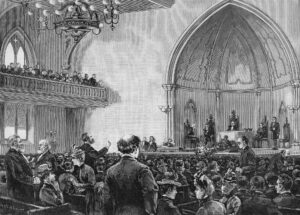If you have never heard of the name F. W. Robertson, then let me quickly fill you in. He was prolific English preacher whose sermons had an incalculable impact on both sides of the Atlantic, and which, through several published volumes, are continuing to advance God’s Kingdom even to this day.
Now, you might think that a preacher of this sort who left such a legacy as that was probably always confident, always willing and always eager to preach. But if the history books are correct, for F. W. Robertson that just wasn’t the case. Sometime before he began preaching, when Robertson was determined to be a solider, his father suggested that instead of military service he go into ministry. Robertson reluctantly replied: “Anything but that! I am not fit for it.”[1] He enlisted and was soon to be sent to India.
As he waited for his departure date, more people in his sphere brought to him arguments for why he ought to be ordained. Five days before he was to ship out Robertson finally and reluctantly decided to go to Oxford to begin his training for ordination
My tendency in the past has been to view reluctance with regard to the Lord’s will as a negative thing. I mean, shouldn’t I be immediately zealous for whatever the Lord would call me to? Shouldn’t I act without hesitation? Isn’t reluctance akin to a lack of faith?
A few days ago, as I read Robertson’s reply to his father it finally struck me that reluctance can actually be a beautiful thing, and that perhaps Robertson’s ministry was even more fruitful and even more God glorifying because of the hesitation from which it began and of which the Lord overcame.
Take a moment and think about the effect of reluctance in your life, when it is with regards to acting on something the Lord may be calling you to.
Reluctance can Produce Greater Prayerfulness
When the Lord seems to be leading us to take a step in a direction that we are hesitant to go in, often we can end up being more prayerful and patient in making the decision then we would be otherwise because of a determination to be sure that this of God. We see hints of this even in Robertson’s life, don’t we? His father’s words alone were not enough, but as other people began to chime in and make the same suggestion, eventually it was undeniable and he entered into ministry with a sureness that God had called him to it.
We ought to be soaking our movements and decisions in patient and persistent prayer.
Of course, this is not to suggest that is a good to be dragging our heals in obedience, but simply that we ought to be soaking our movements and decisions in patient and persistent prayer, in order that we might know His will and be able to say with Jesus in confidence, “Not my will, but yours, be done.”
Reluctance can Produce Greater Dependence
When you step into something new with a reluctance like Robertson who said “I am not fit for this” or like Moses who said similarly “Who am I, that I should go to Pharaoh” (Exodus 3.11), you are inclined to cling to Jesus like a drowning man clings to a life preserver.
In that situation, where you are in it because God called you to it, but you don’t know how you can possibly do it, the strength of God becomes all that you have. And what better posture could you have than that, since any confidence in yourself would be a false confidence anyway. As Jesus himself said, “Apart from me you can do nothing” (John 15.5).
Jesus’s desire for us is that we would be solely dependent on Him, drawing all of our strength from Him, in every situation. Reluctance exposes to us our own weaknesses and so makes that dependence on Jesus much more possible than when we enter in with confidence in our own strength.
Reluctance can Produce Greater Praise
With the last two in mind, this one kind of goes without saying. When instead of reluctance there is an eagerness that lacks in prayerfulness and exudes self-confidence, it is easy for the glory to be directed back at ourselves and for minimal praise be given to God. But if reluctance leads to a prayerfulness in discerning God’s will and a dependence on Him for His strength, then when our action bears fruit, giving God the all glory and all the praise will seem to be the only response that makes sense.
When we can look back and see that God not only overcame our reluctance but that He used us to accomplish what we never thought possible on our own strength, we will (I think) quite naturally start saying with the apostle Paul, “But far be it from me to boast except in the cross of our Lord Jesus Christ” (Galatians 6.14).
So maybe reluctance isn’t always a bad thing. Maybe at times it can be the best thing. Maybe its for these reasons and others that God continues to call and use the reluctant.
Maybe next time we feel reluctant to step out in faith, we will step into the God-glorifying potential of our reluctance.
[1] David Dunn Wilson, “’The Glorious Unseen’ The Life and Thought of F.W. Robertson,” The Expository Times, Vol 30 (1980), 40.
























